Walnuts shells are effective at deflecting even the most determined assaults, but what lies within is well worth the effort and many animals have evolved the tools to crack this tasty nut.
However, the budgie is not among those that have the necessary tools to open this type of nut, so, can budgies eat walnuts even though they cannot open them?
The answer is yes, budgies can eat walnuts, but they’ll need help from a human to make it possible. Once shelled, walnut hearts make a delicious and energy-rich treat.
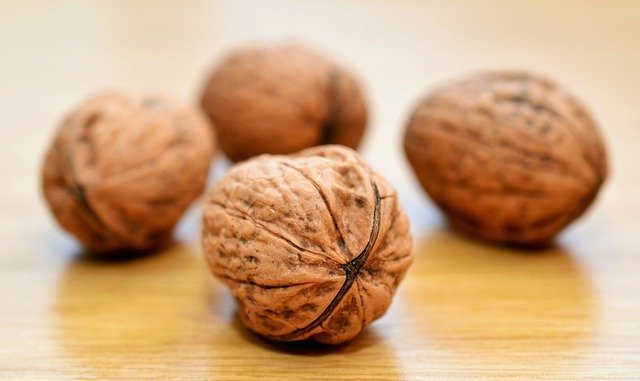
Nutritional Value of Walnuts
The nutritional content of walnuts based on 10g of shelled walnuts
| Typical Values | Per 10g |
| Fat | 6.9g |
| of which saturated | 0.56g |
| Carbohydrate | 0.31g |
| of which sugars | 0.25g |
| Fibre | 0.35g |
| Protein | 1.7g |
| Salt | 0.01g |
How to Prepare Walnuts for Budgies to Eat
If you buy your walnuts whole or are lucky enough to have a nearby tree to supply your needs, your first step when preparing them is to wash them thoroughly.
Just like fruits and veggies, nuts can be covered in pesticides and dirt.
Even though the portion you intend to eat is protected within the shell, you may transfer contaminants when cracking them open.
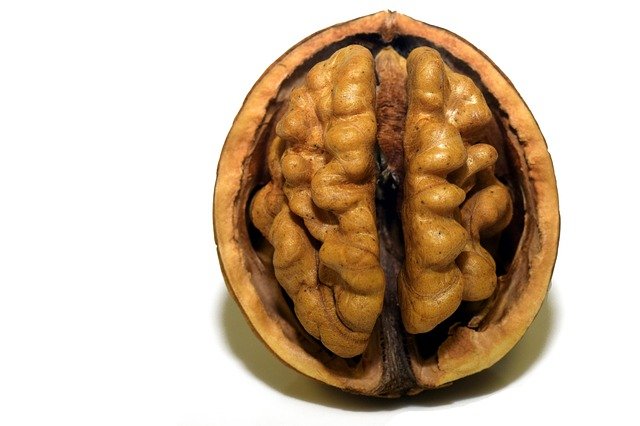
Speaking of cracking, that’s the next step.
There are many different types of nutcrackers to choose, from the utilitarian hand-held lever to the chomping mouth of a wooden soldier, inspired by the aptly named play “The Nutcracker.”
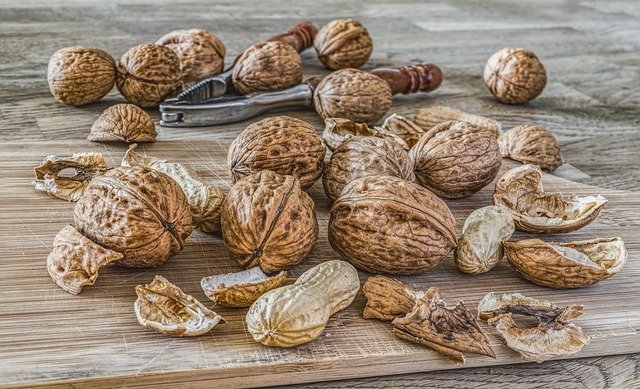
If you don’t have one of these, a hammer or similar smashing tool will get the job done.
Alternatively, you can buy your walnuts pre-shelled. This will save you time, mess and will reduce the possibility that you will feed sharp shell fragments to your budgie.
When making your selection, opt for unsalted varieties, as the salt poses a health risk to your bird. Stick to raw walnuts as well. Roasted lose a significant portion of their nutrients.
With the shell removed your budgie can easily tuck into the succulent, crumbly nut. However, one whole nut is too rich of a meal for these little guys, due to the high-fat content.
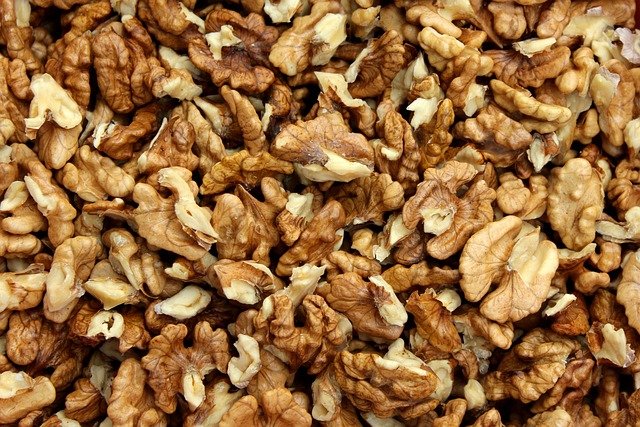
Break the nut up into smaller, beak sized chunks, and only give your budgie a few of these every few days.
Walnuts are often sprinkled over salads for humans, and pairing them with veggies is a good call for budgies as well. This adds in additional nutrients and hydration to the meal.
In the event that you already have cooked walnuts on hand, there is nothing wrong with feeding them to your budgie — provided they are not seasoned with salt or sugar.
You can prepare them just as you would the raw variant. Who knows, your budgie might appreciate the roasted flavour.
Are Walnuts Good for Budgies?
Walnuts are great for budgies in small doses. They’re a high fat-rich food, and too much could quickly lead to unhealthy weight gain and obesity. Walnuts are as much as 65% fat.
This makes them a superb energy source for you budgie as fat is an essential part of their diet. With portion control, this nut can fulfil that dietary requirement and is a good choice to do so.
The fat in walnuts is mostly monounsaturated, which is considered a heart-healthy form of fat.
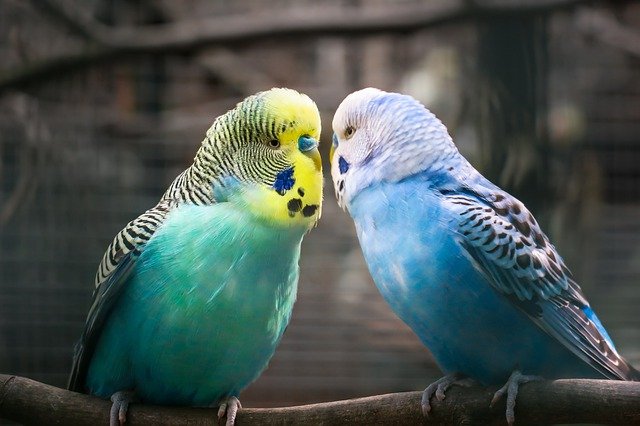
Meanwhile, the polyunsaturated fats present consist of omega-3 and omega-6 fatty acids, particularly linoleic and alpha-linoleic acids.
These are also good for your budgie’s heart health, and they also fight inflammation and ensure healthier blood fats.
Antioxidants such as catechin and ellagic acid in these nuts help to prevent heart disease, and melatonin ensures your budgies sleep schedule is consistent.
Walnuts provide all these benefits, and that’s before factoring in their macronutrients.
Protein is the second most prevalent nutrient in walnuts after fat, and it is essential for proper budgie development.
After protein are carbs, though in walnuts these are primarily in the form of fibre, which aids in your bird’s digestion.
The top 5 vitamins that walnuts contain are:
- Vitamin A
- Vitamin B6 (pyridoxine)
- Vitamin B9 (folate)
- Vitamin C
- Vitamin E
Vitamin A keeps your budgie’s sight sharp and is especially useful to a mating pair for its benefits to reproduction and development.
Vitamin B9 is used in blood cell production, and B6 is good to regulate mood.
The vitamin C content is good for staving off illness, and the vitamin E in walnuts is a notable variant called gamma-tocopherol, which may have unknown benefits.
Minerals present within walnuts at significant levels are:
- Calcium
- Copper
- Iron
- Magnesium
- Phosphorus
Calcium, magnesium, and phosphorus all work together to strengthen, grow, and ensure the proper structure of bone matter and cartilage.
Deficiencies lead to budgies developing twisted toes and necks, thin bones, and deformed beaks.
Iron is essential for proper blood health and adequate transmission of oxygen throughout the body.
Copper helps that process by facilitating red blood cell formation, but it also assists in immune and nervous system functions.